Coffee mixes well with herbs to moderate its effects or to create synergistic blends. Coffee lowers levels of type 2 diabetes due to flavanoids, magnesium and increasing the metabolic rate. Alcoholics at risk for cirrhosis of the liver have lower rates. Asthmatics have fewer attacks and can head them off with coffee or a coffee foot bath. Alzheimer’s can be slightly reversed and progression reduced. Coffee is associated with 24%lower levels of colon cancer, 21% lower incidence of gallstones and an 60% reduction in Parkinson’s Disease and in a dose-dependent manner will reduce inflammation as marked by C-reactive protein.
 October 16, 2009 – Coffee Herbs
October 16, 2009 – Coffee Herbs
Copyright by Karen S. Vaughan, L.Ac., MSTOM
We have all heard that coffee is bad for us, and it does have alkaloids and essential oils that can be overly stimulating. Caffeine can stress our adrenal glands and it is energetically warming which is not always desirable. Most commercially available coffee is highly sprayed with pesticides, which is why shade-grown organic is best. Coffee can potentiate medications or medicinal herbs which means that we may need to adjust dosages. More than three cups daily during pregnancy increases the miscarriage rate (but decaf correlates with even more.) It makes fibrocystic breasts and fibroids worse and eliminating coffee can increase good health in many other areas. Coffee can displace green or black tea which have numerous health benefits. It may keep us up at night (although there are certain individuals who sleep better with it.) In fact many of us who drink coffee are addicted and will get headaches if it is withdrawn, which is not desirable.
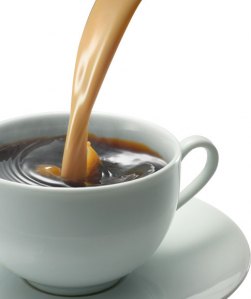 It is important to remember that coffee is not the same thing as caffeine, although it contains caffeine. Coffee is a complex herbal beverage with medicinal effects that may be good or bad. It is an aqueous solution with magnesium, potassium, flavanonids, chlorogenic acid, Vitamin E, niacin and essential oils as well as caffeine. Although caffeine in its dry form is a diuretic, studies show that it causes you to pee sooner rather than more. There is more water than caffeine in coffee. Since you pee sooner, I use as a rule of thumb that you lose approximately 1/4 of the fluid in hydration power. Overall coffee hydrates you, but not as well as water.
It is important to remember that coffee is not the same thing as caffeine, although it contains caffeine. Coffee is a complex herbal beverage with medicinal effects that may be good or bad. It is an aqueous solution with magnesium, potassium, flavanonids, chlorogenic acid, Vitamin E, niacin and essential oils as well as caffeine. Although caffeine in its dry form is a diuretic, studies show that it causes you to pee sooner rather than more. There is more water than caffeine in coffee. Since you pee sooner, I use as a rule of thumb that you lose approximately 1/4 of the fluid in hydration power. Overall coffee hydrates you, but not as well as water.
Some qualities of coffee moderate other negative effects. For instance while caffeine may increase blood sugar, there are trace elements in coffee like magnesium that bring it down and coffee may cause higher levels of sugar-burning physical activity from its stimulant effect. Similarly some of the stimulating effects from the essential oils will exist in decaffeinated coffee.
But coffee has many good qualities. It has one of the highest flavanoid levels of anything most Americans consume. It contains magnesium which most of us are deficient in. It is one of the few bitters that Americans consume, which helps digestion and protects against depression. Coffee is associated with lower levels of type 2 diabetes- three to four cups a day results in a 27% reduction rate and high consumption- over 10 cups with a 55% reduction- (1) Alcoholics at risk for cirrhosis of the liver have lower rates. Asthmatics have fewer attacks and can head them off with caffeinated coffee or a coffee foot bath.(6) Coffee is associated with 24% lower levels of colon cancer (2, 4), 21% fewer incidents 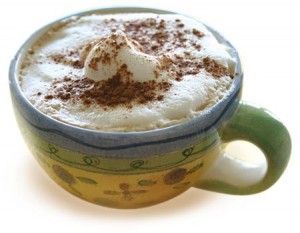 of gallstones (5) and 60% less Parkinson’s Disease.(3) A recent study found that it lowered inflammation marked by C-Reactive Protein levels in a dose dependent way, where two cups equaled the level of statin drugs in lowering inflammation. The amount of caffeine in three cups of coffee a day can prevent and slightly reverse the progression of Alzheimer’s’.
of gallstones (5) and 60% less Parkinson’s Disease.(3) A recent study found that it lowered inflammation marked by C-Reactive Protein levels in a dose dependent way, where two cups equaled the level of statin drugs in lowering inflammation. The amount of caffeine in three cups of coffee a day can prevent and slightly reverse the progression of Alzheimer’s’.
People with autoimmune disease or yin deficiency (hot flashes, evening fevers, nightsweats, heat in the feet and palms or body fluid deficiency) probably should not drink coffee. People who are always hot, with flushed skin, racing pulses and high blood pressure should avoid it. Although the effects on blood pressure are small, it speeds up women’s hearts and constricts men’s blood vessels giving a temporary small rise in blood pressure.
Coffee is stimulating, tasty, and is a decent liver qi tonic. It is the only bitter food that many of us ingest, and bitters stimulate bile and help digestion. Bitter foods are one of the 5 basic flavors in Chinese medicine and all are considered essential, ( bitter greens would be a healthier choice though.) In judicious quantities it can stimulate the brain and allow thoughts and conversation to flow. Most avid coffee drinkers will not give it up.
So the idea is to drink enough for enjoyment but not so much that we are physically addicted. And to drink it in a way that does not aggravate underlying physical conditions.
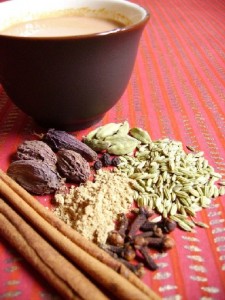 I do want to suggest substitutes since coffee can have negative attributes. Green tea, black tea or chai tea (with herbs like cinnamon, cloves and cardamom) are great substitutes and are healthier. These true camellia leaf teas have lower levels of caffeine and higher levels of catechins which can help reduce arthritis. Then there are the stronger herbal teas like yerba mate, guarana, kola nut or Morning Thunder. These may have caffeine-like effects. More benign are the coffee substitutes. My favorites among these are Dandy Blend
I do want to suggest substitutes since coffee can have negative attributes. Green tea, black tea or chai tea (with herbs like cinnamon, cloves and cardamom) are great substitutes and are healthier. These true camellia leaf teas have lower levels of caffeine and higher levels of catechins which can help reduce arthritis. Then there are the stronger herbal teas like yerba mate, guarana, kola nut or Morning Thunder. These may have caffeine-like effects. More benign are the coffee substitutes. My favorites among these are Dandy Blend(a dandelion based instant coffee substitute) (6), Teeccino)
(especially the vanilla or hazelnut flavors) and Soyoffee, a roasted soybean beverage. If you can’t drink coffee and miss it, I urge you to try them.
But this is a piece on coffee and the herbs that mix well with coffee. You can of course drink a cup of pure coffee in the morning, preferably a shade-grown organic coffee. It can even be espresso since the water passes through the grounds faster than normal coffee, making up for its higher concentration by lowering the caffeine per ounce. Three to four cups of coffee is probably the upper limit for healthy use in those who can drink it, (although it lowers inflammation in a dose dependent way) but most of us will be addicted at that rate. But what do you do if you want to drink coffee throughout the day?
I suggest mixing coffee with compatible herbs. Coffee has a strong flavor which mixes well with certain herbs and can cover others. You want a compatible flavor which does not dilute the overall effect of the beverage. And you want herbs which moderate any negative effects of coffee or which will benefit you in some way.
One company has actually infused coffee with herbs or minerals such as calcium, or echinacea , but their link has disappeared. Another company mixes it with ginseng or ganoderma (reishi) http://www.ginseng-coffee.com/ganoderma_coffee/ganoderma_coffee.html Frankly I like to mix mine with dry nettles, astragalus, and chicory.
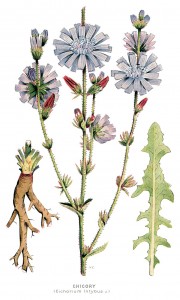 When I mix herbs with coffee I usually use a dark roasted coffee, to get the maximum flavor but one which has some of the more complex Columbian beans in as well. (Some espresso roast is all roast and little coffee flavor.) I used to make this with half water-processed decaffeinated coffee, but now I mix with chicory which adds a mellowness that I prefer. I can drink a mix of up to a half coffee with compatible herbs and it still feels like coffee, but I can only get a two-thirds coffee blend past my husband. If you want to add more herbs, the trick is to not decrease the coffee any more.
When I mix herbs with coffee I usually use a dark roasted coffee, to get the maximum flavor but one which has some of the more complex Columbian beans in as well. (Some espresso roast is all roast and little coffee flavor.) I used to make this with half water-processed decaffeinated coffee, but now I mix with chicory which adds a mellowness that I prefer. I can drink a mix of up to a half coffee with compatible herbs and it still feels like coffee, but I can only get a two-thirds coffee blend past my husband. If you want to add more herbs, the trick is to not decrease the coffee any more.
The traditional coffee herb is roasted chicory root, found in French and Cajun cooking. Chicory is energetically cooling, and good for the liver. It is available roasted and granulated and looks like coffee. Often you can find it premixed. Dandelion, a similar plant with a slightly stronger effect, may be found roasted and granulated but is significantly more expensive.(7)
Toasted grains are often sold as coffee substitutes. Teechino has a fairly high concentration of roasted grains. I find that I like them less than other substitutes and would only add up to an eighth to a quarter of the quantity. Plus I am trying to reduce grains in my diet, so I don’t use them much anymore.
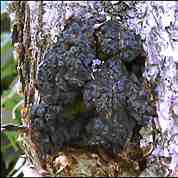 Several of the medicinal mushrooms have coffee like tastes and mix well, but if you want the true medicinal effects you need to simmer them for an hour before using the infusion to make coffee. Chaga, an ugly fungus that grows on birch trees is sold granulated to prepare in drip coffee makers, but I would still simmer it. (8) Reishi ( also called Ganoderma or Ling zhi) can be found sliced. (9) Whole or chunk reishi needs to be simmered. If you are cooking it for medicinal purposes you can simmer it for a few hours, with a little cinnamon and orange peel added at the end, then pout it through a coffee filter with your coffee or coffee blend. Mushroom Harvest makes pre-cooked mushrooms that can be stirred into coffee and I have been using their Lion’s mane and Maitake.
Several of the medicinal mushrooms have coffee like tastes and mix well, but if you want the true medicinal effects you need to simmer them for an hour before using the infusion to make coffee. Chaga, an ugly fungus that grows on birch trees is sold granulated to prepare in drip coffee makers, but I would still simmer it. (8) Reishi ( also called Ganoderma or Ling zhi) can be found sliced. (9) Whole or chunk reishi needs to be simmered. If you are cooking it for medicinal purposes you can simmer it for a few hours, with a little cinnamon and orange peel added at the end, then pout it through a coffee filter with your coffee or coffee blend. Mushroom Harvest makes pre-cooked mushrooms that can be stirred into coffee and I have been using their Lion’s mane and Maitake.
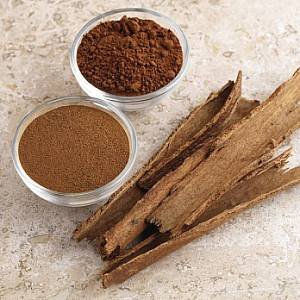 Cinnamon is another good coffee herb, also useful for reducing diabetes incidence. I tend to use up to a tablespoon per cup because it lowers blood sugar. Too much may clog a gold filter since it tends to be ground fine and can become gelatinous when wet, but it can be added directly to the pot or the coffee cup. Chinese or Indian cinnamon tends to be stronger than American culinary cinnamon. Strong cinnamon is warming. In smaller amounts you can add cloves, cardamom seed, or star anise, which are warming herbs as well, but add distinct tastes.
Cinnamon is another good coffee herb, also useful for reducing diabetes incidence. I tend to use up to a tablespoon per cup because it lowers blood sugar. Too much may clog a gold filter since it tends to be ground fine and can become gelatinous when wet, but it can be added directly to the pot or the coffee cup. Chinese or Indian cinnamon tends to be stronger than American culinary cinnamon. Strong cinnamon is warming. In smaller amounts you can add cloves, cardamom seed, or star anise, which are warming herbs as well, but add distinct tastes.
To increase testosterone levels you can add pine pollen or lily pollen (if you can find them) or cattail pollen which can be obtained from Chinese herb stores. (10) Pollens tend to invigorate the blood and are somewhat bitter. You can also grind up the leaves of Yin yang huo (Epidemium, Horny goat weed) although too much will give a tea like taste.
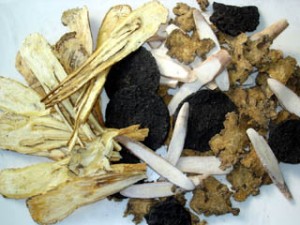 Dang gui, Chinese angelica, is a strong flavored herb that nourishes the Blood and which can combine with coffee. (I use this sometimes to get dang gui into someone who doesn’t appreciate the taste.) I often combine it with the other Si wu tang/Four Agents herbs, chuanxiong, rehmannia and white peony for someone who needs to build and move blood. For medicinal treatment I would decoct the herbs and throw in a quarter cup of ground coffee per quart at the end. For subacute conditions I might just put the ground herbs in the coffee strainer.
Dang gui, Chinese angelica, is a strong flavored herb that nourishes the Blood and which can combine with coffee. (I use this sometimes to get dang gui into someone who doesn’t appreciate the taste.) I often combine it with the other Si wu tang/Four Agents herbs, chuanxiong, rehmannia and white peony for someone who needs to build and move blood. For medicinal treatment I would decoct the herbs and throw in a quarter cup of ground coffee per quart at the end. For subacute conditions I might just put the ground herbs in the coffee strainer.
To increase qi, I often boil astragalus which has a slightly sweet neutral flavor for 20 minutes then use the water to make coffee. One can also mix coffee with Si Junzi Tang, the Four Gentlemen Decoction (Codonopsis, attractyloides, poria and licorice as above.)
Remember that the energetics of the coffee are added to any medicinal or tonifying coffee brew, but if you were going to drink the coffee anyway and if the coffee helps you take your herbs then don’t worry too much.
For further reading on the pros and cons of coffee: http://www.sixwise.com/newsletters/06/03/22/coffee.htm and the Morning Coffee and Afternoon Tea blog at http://coffeeworks.blogs.com/coffee_and_tea/coffee/
See also Eric Brand’s article on ginseng and coffee and the Herbal Blog Party on morning beverages.
………….
References
1. Jaakko Tuomilehto, MD, PhD; Gang Hu, MD, PhD; Siamak Bidel, MD; Jaana Lindström, MSc; Pekka Jousilahti, MD, PhD. Coffee Consumption and Risk of Type 2 Diabetes Mellitus Among Middle-aged Finnish Men and Women Journal of the American Medical Association, Vol. 291, Num. 10, March 10 2004
2. Christine Haran, Wake Up to the Good News About Coffee, March 23, 2004
3. Brunilda Nazario, MD. Coffee the New Health Food? April 12, 2004
4. European Journal of Cancer Prevention, 2002; 11: 137-145. “Coffee and tea consumption and cancers of the bladder, colon and rectum”
5. Michael F. Leitzmann, MD; Walter C. Willett, MD; Eric B. Rimm, ScD; Meir J. Stampfer, MD; Donna Spiegelman, ScD; Graham A. Colditz, MD; Edward Giovannucci, MD A Prospective Study of Coffee Consumption and the Risk of Symptomatic Gallstone Disease in Men Journal of the American Medical Association 1999;281:2106-2112.
6.Available from Goosefoot Acres phone: 800-697-4858
7. Both Chicory and Dandelion, in roasted granulated form can be obtained from the Frontier Herbal Cooperative www.frontierherbs.com. Leaf and Bean in Brooklyn carries Chicory and a coffee mix can be found in Chinatown grocery stores like Dynasty Groceries on Elizabeth and Hester Streets in Manhattan.
8. Available from Herbalist and Alchemist. www.herbalist-alchemist.com/ or Woodland Essence www.woodlandessence.com/herbal.htm
9. Dynasty Groceries and elsewhere in Chinatown.
10. Kamwo herbs, on Grand Street in Chinatown for both cattail pollen- pu huang or horny goat weed. James Green has provided information on the testosterone value of pollens. (Semen is a pollen rather than a seed because it is not a fertilized ovum.)
………
Contact Member:
Acupuncture and Herbs by Karen Vaughan, L.Ac.
253 Garfield Place 1R
Brooklyn, NY 11215 US
(718) 622-6755
